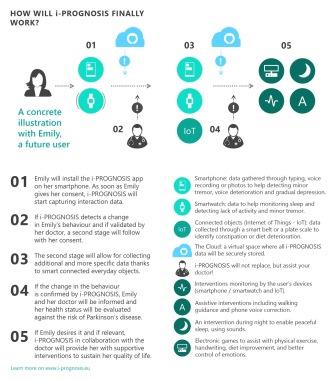i-PROGNOSIS project builds early detection test of Parkinsons’ Disease

Related topics
Health ICT Research & Innovation ICT Health, Demographic Change and Wellbeing Europe in a changing world - Inclusive, innovative and reflective societies EU countriesdate: 15/03/2016
Project: Intelligent Parkinson eaRly detectiOn Gu...
acronym: i-PROGNOSIS
See also: CORDIS
i-PROGNOSIS is a research project funded by the EU Research Programme Horizon 2020. Aristotle University of Thessaloniki is the Coordinator of the i-PROGNOSIS Project with a consortium consisting of 11 partners from six European countries, i.e., GREECE Aristotle University of Thessaloniki, Centre for Research and Technology Hellas, Microsoft Innovation Center Greece, COSMOTE Mobile Telecommunications S.A. BELGIUM Age Platform Europe, GERMANY Technische Universität Dresden, Fraunhofer-Gesellschaft, PORTUGAL Faculdade de Motricidade Humana, PLUX Wireless Biosignals S.A., SWEDEN Karolinska Institutet, UNITED KINGDOM King’s College London
i-PROGNOSIS will use data collected among a large community of users (aged 50+) through the daily use of their smart phone and to create an ICT-based behavioural analysis approach for capturing the Parkinson’s Disease symptoms. In a second stage, the project will develop new type of interventions to support patients’ quality of life.
The main aim of i-PROGNOSIS is to do a behavioural analysis of a large-scale community thanks to new technologies in order to capture as early as possible the appearance of Parkison’s Disease symptoms, notably in relation to progressive frailty, falls and emotional shift towards depression. To do so, i-PROGNOSIS proposes a radically novel approach by using large scale collection of users’ data from the natural use of their smartphone, and eventually their smartwatch, thanks to a dedicated application. The project will also develop interventions to improve the quality of life of patients and, when relevant, the participants will be proposed to use them, this being done in close partnership with their doctors.
Last but not least, i-PROGNOSIS will adopt the Monitoring and Assessment Framework developed by the European Innovation Partnership on Active and Healthy Ageing: this will help to evaluate the i-PROGNOSIS interventions and to converge towards efficient interventions output.
